|
|
|
Sort Order |
|
|
|
Items / Page
|
|
|
|
|
|
|
| Srl | Item |
| 1 |
ID:
124248
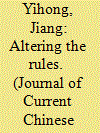

|
|
|
|
|
| Publication |
2013.
|
| Summary/Abstract |
This study looks at Chinese homeowners' participation in policymaking. Drawing on evidence from Guangzhou and Beijing, it shows that various organised homeowner activists have moved upstream in the policy process and have begun to push beyond policy implementation into the domain of agenda setting and "rule-making". These advocates display rights-conscious patterns of behaviour that are closer to that of interest or lobby groups than to the typical repertoire of Chinese contentious citizens. The study suggests that this kind of political participation is on the rise amongst Chinese homeowner activists. This result complements and extends other recent findings that suggest the Chinese policy process is gradually opening up. Such a trend could have significant implications and calls for more research in different domains of state-society relations.
|
|
|
|
|
|
|
|
|
|
|
|
|
|
|
|
| 2 |
ID:
163467
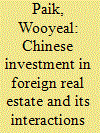

|
|
|
|
|
| Summary/Abstract |
Since the early 2000s, a great tide of Chinese "go outside" (zouchuqu), or outbound foreign investment, has happened in many regions and industries of the world. Among these, real estate has emerged as one of the most rapidly increasing outbound investments from China in the 2010s. As a result, Chinese investors, both enterprises and individuals, have had an extensive and growing impact on host states and societies, which are largely developed and democratic. This study analyzes the multifaceted interactions between Chinese foreign real-estate investors and host states and societies using the case of Jeju Province in South Korea from 2010 to 2018. More specifically, it analyzes the responses of the host country's national and local governments, as well as its grassroots civil society, to the soaring and often unconstrained Chinese investment in its real estate, focusing on the role of a host country's democratic institutions.
|
|
|
|
|
|
|
|
|
|
|
|
|
|
|
|
| 3 |
ID:
090113
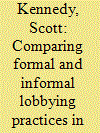

|
|
|
|
|
| Publication |
2009.
|
| Summary/Abstract |
The marketization of China's economy and the attendant need for a supporting regulatory framework have resulted in extensive lobbying by Chinese and foreign industry. The central party-state has adopted an ambivalent posture toward this development. On the one hand, the government has encouraged the development of industry associations, public hearings, and comment-and-response periods for draft laws and regulations to routinize public policy consultations. On the other hand, the central party-state is deeply concerned about the political consequences of permitting greater social activism, and hence, it continues to constrain the maturation of these same formal institutions and processes. As a consequence, informal lobbying practices, such as direct lobbying and manipulation of the media, have become more prominent vehicles for industry involvement in the policy process.
|
|
|
|
|
|
|
|
|
|
|
|
|
|
|
|
| 4 |
ID:
130442
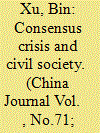

|
|
|
|
|
| Publication |
2014.
|
| Summary/Abstract |
Consensus crisis and civil society: the Sichuan earthquake response and state-society relations
A consensus crisis is characterized by challenges to the state's managerial capacity, a critical need for civil society's services, a general agreement on priorities and goals, and the state's efforts to construct a morally respectable image. These features amplify the structural conditions favorable for relatively amicable state-society interactions. Existing studies of social response to the 2008 Sichuan earthquake focus on state-society relations, but neglect the role of situations. I argue that the earthquake is an example of a consensus crisis, which provided civil associations with a situational opening of political opportunity.
|
|
|
|
|
|
|
|
|
|
|
|
|
|
|
|
| 5 |
ID:
187923
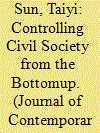

|
|
|
|
|
| Summary/Abstract |
It is often the conception in the literature that civil society’s major challenge in an authoritarian country like China would be from the state directly. This study utilizes over 1200 surveys conducted in Sichuan Province, 67 in-depth interviews with local government officials and CSO leaders, and case studies from communities that CSOs operated to provide an often-overlooked challenge. Based on the research in rural Sichuan, this article finds that the Chinese state at the local level does not spend a significant amount of energy directly interfering with CSOs, but uses institutional constraints to create divisions between the citizenry and CSOs. This article proposes the trialism conception in understanding civil society in authoritarian countries. The state could create conditions that reduce the confidence of individual citizens in CSOs and thus control society from the bottom up without having to apply a significant amount of direct repressions to the CSOs.
|
|
|
|
|
|
|
|
|
|
|
|
|
|
|
|
| 6 |
ID:
132780
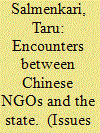

|
|
|
|
|
| Publication |
2014.
|
| Summary/Abstract |
Researchers in the field of Chinese studies often assume that the ability of Chinese NGOs to operate freely increases with their distance from the government, and they classify NGOs accordingly. However, this study suggest that in China distance from the state is not a fixed characteristics of an organization nor is increased distance always an advantage. Even unregistered NGOs adopts various strategies that bring them close to the states. Forthermore, country to common expectations, independence does not guarantee that an NGO will adopt democratic decision-making structure or increase its contacts with ordinary citizens at the grassroots levels.
|
|
|
|
|
|
|
|
|
|
|
|
|
|
|
|
| 7 |
ID:
080295
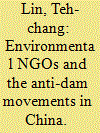

|
|
|
|
|
| Publication |
2007.
|
| Summary/Abstract |
The nature of state-society relations in China has been undergoing a process
of change over the past few decades. It is a process that cannot be obscured, in
which the state and society are incessantly shaping and reshaping their relations. In
the wake of market-oriented reforms, and due to the emergence of environmental
non-governmental organizations (NGOs), the Chinese state has also gradually opened
up to the international community, allowing the linkages between international and
domestic NGOs to be enhanced, and this has further transformed state-society
relations in China. Focusing on the development of environmental NGOs, this
article provides insights into China's changing state-society relations and explores the
key factors that greatly facilitate the transformation of these relations. The anti-dam
movements, which have developed in reaction to the Three Gorges Dam and the
Nujiang project, as well as the issues of resettlement and environmental protection
associated with the dam construction, have caused a new wave of interaction between
the state and society and resulted in a new social movement with Chinese
characteristics
|
|
|
|
|
|
|
|
|
|
|
|
|
|
|
|
| 8 |
ID:
130550
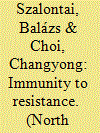

|
|
|
|
|
| Publication |
2014.
|
| Summary/Abstract |
Purpose-This article investigates whether certain social and subnational groups that have shown resistance against other one-party states might play a similar role in North Korea.
Design/methodology/approach-Comparing the DPRK with various Communist regimes and Baathist party-states in Syria and Iraq, this article examines the following social groups as potential factors of resistance: industrial workers, private entrepreneurs, and religious, ethnic and regional identities.
Findings-Resistance has not been wholly absent in North Korean, but the disaffected social groups have lacked sufficient bargaining power, while the state has occasionally refrained from steps that triggered protests in other countries.
Practical implications-By comparing the DPRK with various types of regimes (pre-reform Communist systems, partially market-oriented Communist systems, and Baathist party-states), the article also seeks to investigate whether the dynamics of North Korean society is largely unique, or if it can be at least partially explained by means of analogy.
|
|
|
|
|
|
|
|
|
|
|
|
|
|
|
|
| 9 |
ID:
187418
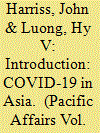

|
|
|
|
|
| Summary/Abstract |
In this introduction to studies of the politics of the COVID-19 pandemic in four Asian states—India, Pakistan, Vietnam, and South Korea—we first discuss the difficulties in evaluating the performances of different countries, given the varying reliability of data and the different possible criteria that may be applied. In our studies we aim rather to illuminate the process of different state responses, and we go on to summarize evidence on different patterns of response across Asia, situating the four country studies in a comparative context. We then review arguments in the literature about the determinants of different responses, before presenting our framework for the analysis of the politics that underlie these differences. Political leadership has undoubtedly exercised a powerful influence, but in the structural context of the relationships of state and citizens. We argue that understanding of these relationships is advanced by an analytical framework that draws on state-in-society approaches developed in the work of Joel Migdal, Michael Mann, and Peter Evans.
|
|
|
|
|
|
|
|
|
|
|
|
|
|
|
|
| 10 |
ID:
168019
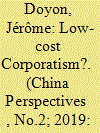

|
|
|
|
|
| Summary/Abstract |
The Communist Youth League has developed a network of sub-organisations to expand its reach at minimum cost. It exemplifies the low-cost corporatism model. Following this model, mass organisations maintain a corporatist relationship with the Party while diversifying their activities through structures they supervise. These structures also provide them with additional material and human resources. In this configuration, the Communist Youth League maintains an equilibrium between dependence on the Party and attractiveness to young people. However, reforms put forward under Xi Jinping challenge this fragile equilibrium by strengthening Party control over the League and its sub-organisations.
|
|
|
|
|
|
|
|
|
|
|
|
|
|
|
|
| 11 |
ID:
180529
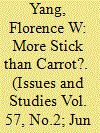

|
|
|
|
|
| Summary/Abstract |
After President Xi Jinping came to office, the Chinese government tightened its ideological control over establishment intellectuals and particularly the university teachers. This project aims to answer the question of why and when an authoritarian state chooses to do so. It focuses on the CCP’s policy toward establishment intellectuals under Xi and explores the most applicable explanation for this policy shift. Based on the existing literature on the cyclical model of state-intellectual relations in China, we propose a new model of “Dual Methods in State-Intellectual Relations.” The model demonstrates that the CCP has employed dual methods of repression and co-optation on intellectuals adopting different roles. Leaders choose repression when they perceive that the legitimacy of their rule is challenged externally or internally by criticism and collective actions led by intellectuals. In this case, the goal of repression is to either set up a new “red line” or warn intellectuals that they have crossed it.
|
|
|
|
|
|
|
|
|
|
|
|
|
|
|
|
| 12 |
ID:
180010
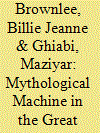

|
|
|
|
|
| Summary/Abstract |
The article revisits ‘sectarianism’ as an epistemic venue within the context of a Great Civil War in the Middle East (2001-2021), a label that includes the overarching narratives of political life in the aftermath of 9/11 up to the aftermath of the so-called ‘Arab Spring.’ By introducing the notion of the ‘mythological machine,’ it argues that ‘sectarianism’ is a myth, something that does not exist in real terms, but which has real world effects. The mythological machine is a device that produces epiphanies and myths; it is a gnoseological process, which has cultural, social and political effects through the generation of mythological facts and, as a machine, it does so through both guiding and automatized mechanisms. Through this interpretive shift, the article proceeds through several theoretical steps using a variety of cases from across West Asia and North Africa, contextualizing them within global political events. Firstly, the article argues that it is ‘civil war,’ shaped by the work of the mythological machine that governs state-society relations and transnational politics in the Middle East. Then, the article discusses how the mythological machine incorporates a semantic othering via mythological thinking, speak and practice that shapes the perception and experience of civil wars. To conclude, the article discusses how the mythological machine displaces people’s status in the context of civil wars leading to the emergence of new forms of belonging and nation-making. Ultimately, the mythological machine creates what Giorgio Agamben defines as a state without people, a condition exhausting the value of citizenship and the political.
|
|
|
|
|
|
|
|
|
|
|
|
|
|
|
|
| 13 |
ID:
105907
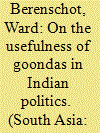

|
|
|
|
|
| Publication |
2011.
|
| Summary/Abstract |
This article discusses the cooperation between small-time criminals (or goondas) and politicians in a locality in Ahmedabad, Gujarat (India). Based on an ethnographic study of local political networks, this article argues that the regular co-operation between politicians and goondas is a product of the inaccessibility of the Indian state to its poorer citizens. The 'criminalisation of politics' is not a sign of moral decay, but a product of the difficulties of (poorer) citizens in dealing with state institutions and the specific nature of the local political competition that these difficulties engender. As local politicians need to develop their capacity to 'get things done' for voters, they need both the 'moneypower' and 'musclepower' of goondas to settle local issues, enforce their authority and manipulate voting.
|
|
|
|
|
|
|
|
|
|
|
|
|
|
|
|
| 14 |
ID:
090094


|
|
|
|
|
| Publication |
2009.
|
| Summary/Abstract |
North Korea is a socialist "dynasty" shrouded in secrecy. The regime's inconsistencies leave even the best of North Korean specialists and commentators befuddled as the country's actions invalidate their predictions. One must, however, understand North Korea's sociopolitical ideology in order to appreciate its inconsistencies as a regime. This paper will discuss the impact of North Korea's ideology in historical and sociopolitical context, as well as show the depth of ideological penetration into every layer of its society. The Juche ideology that has characterized the regime is a peculiar combination of nationalism, Marxism, and Confucianism. Since Kim Il-Sung's death, however, and the succession to power of his son, Kim Jong-Il, North Korea's ideology has metamorphosed into a series of sub-ideologies. The purpose of this paper is to elaborate on the process by which North Korean ideology changed and the paradox between the rise in ideological rhetoric and the weakening legitimacy of the regime under Kim Jong-Il.
|
|
|
|
|
|
|
|
|
|
|
|
|
|
|
|
| 15 |
ID:
171025
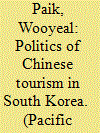

|
|
|
|
|
| Summary/Abstract |
The politics of tourism has not been studied in depth, even though many recognize the growing importance of political factors in tourism economy. As China has risen, it has used its massive volume of outbound tourists and its tourist industry for political gain, with both positive and negative consequences for partner countries. And the recipient countries’ state and society respond to these external impacts from China in various ways. In recent years, this development has alarmed students of tourism and politics in the Pacific Basin. In this context, the case of Chinese tourism in South Korea throughout 2010s sheds light on many aspects of this new and controversial phenomenon and ensuing interactions of various actors at both domestic and international political arenas.
|
|
|
|
|
|
|
|
|
|
|
|
|
|
|
|
| 16 |
ID:
107218
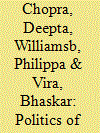

|
|
|
|
|
| Publication |
2011.
|
| Summary/Abstract |
This introduction discusses the articles in this Special Issue, which are all focused on exploring the everyday interactions between marginalised individuals and groups and the state in contemporary India. In particular the articles highlight the experiences of a diverse set of marginalised groups - Muslim artisans and weavers, Dalits, Tibetan exiles and post-conflict victims in Gujarat - in order to work towards an understanding of the politics of citizenship from the margins. Across these articles two interlocking themes emerge. Firstly, how different marginalised groups have experienced, critiqued and engaged with different aspects of the `welfare state'. Secondly, the way in which agencies were articulated from the margins through these processes of engagement, shaping and recasting interactions between the state and society in India. We argue that the deployment of different strategies of engagement with the state by India's marginalised can be viewed as a politics of citizenship, through which marginalised people (re)make themselves as citizens. This essay is thus a call for future research on citizenship as a lived experience which is operationalised in local practices and quotidian interactions between the state and society.
|
|
|
|
|
|
|
|
|
|
|
|
|
|
|
|
| 17 |
ID:
078922
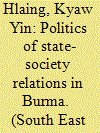

|
|
|
|
|
| Publication |
2007.
|
| Summary/Abstract |
This paper, based largely on interviews, examines relations between the state and a number of societal groups - business, students, the sangha (monks), peasants and workers - in Burma since independence. It argues that state-society relations in Burma cannot be reduced to a series of zero-sum games. Although it is possible that the relations between the state and anti-state activists, such as students and monks, would take the form of zero-sum games, it is argued here that existing studies fail to explain the complexity of the state's relations with those segments of the Burmese population not actively opposed to the state, such as the business community. The paper explores the mutually empowering aspect of state-society relations in Burma by highlighting the benefits that both post-colonial Burmese government officials and various societal groups have gained from their patronage networks. It further shows that, although the parliamentary period was a more democratic one than the two subsequent military periods, the bedrock of state-society relations in Burma throughout the post-colonial period has been clientelism
|
|
|
|
|
|
|
|
|
|
|
|
|
|
|
|
| 18 |
ID:
165594
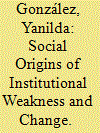

|
|
|
|
|
| Summary/Abstract |
Despite historic increases in crime and violence, Latin America’s police forces are characterized by long periods of institutional weakness punctuated by rare, sweeping reforms. To understand these patterns of institutional continuity and change, the author applies the concept of structural power, demonstrating how police leverage their control of coercion to constrain the policy options available to politicians. Within this constrained policy space, politicians choosing between continuity and reform assess societal preferences for police reform and patterns of political competition. Under fragmented societal preferences, irrespective of political competition, reform brings little electoral gain and risks alienating a powerful bureaucracy. Preference fragmentation thus favors the persistence of institutional weakness. When societal preferences converge and a robust political opposition threatens incumbents, politicians face an electoral counterweight to the structural power of police, making reform likely. Using evidence from periods of continuity and reform in Argentina, Brazil, and Colombia, the author traces both outcomes to shifts in societal preferences and political opposition. Despite the imperative to address citizens’ demands by building state capacity in security provision, these cases show that police reform is often rendered electorally disadvantageous.
|
|
|
|
|
|
|
|
|
|
|
|
|
|
|
|
| 19 |
ID:
161645
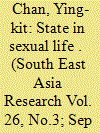

|
|
|
|
|
| Summary/Abstract |
During the 1970s, condoms were introduced into Singapore as a medical device. Health officials described men’s condom use as sharing women’s risks and responsibilities in birth control and family planning. For the officials, condom distribution helped contain the spread of venereal diseases, deal with unwanted pregnancies and maintain an optimal birth rate for national economic development. With the emergence of AIDS and a more self-assertive middle class of well-educated, globally aware citizens, the official discourse on male contraceptives came under fire from social conservatives, who associated condom use with the moral decline of society. This article examines the dialectical relationship between government policies and public perceptions of condom use in Singapore. The 1980s debates over condoms revealed greater male involvement in state-directed contraceptive projects and a burgeoning dichotomy between state and society.
|
|
|
|
|
|
|
|
|
|
|
|
|
|
|
|
| 20 |
ID:
074921
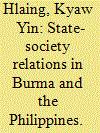

|
|
|
|
|
|
|
|